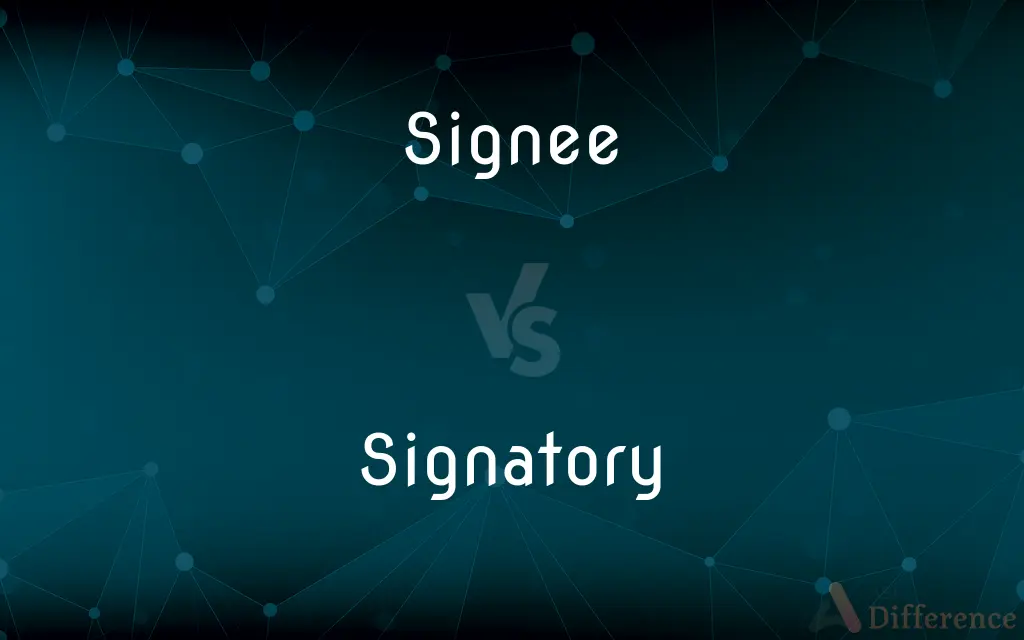Signee vs. Signatory — What's the Difference?
By Tayyaba Rehman — Updated on November 5, 2023
A signee is someone who signs a document, while a signatory is a person or entity who is a party to an agreement.

Difference Between Signee and Signatory
Table of Contents
ADVERTISEMENT
Key Differences
The term "signee" refers to an individual who has signed a document. It doesn't necessarily imply that the signee is a party to the content of the document or agreement; rather, it simply indicates that they have provided their signature. In contrast, a "signatory" is a person or entity who signs a document and is bound by its terms, often used in the context of treaties or formal agreements. The signatory is an official party to an agreement and has a vested interest in its stipulations.
Signees sign documents that could range from a delivery receipt to a petition. Their signature is an acknowledgment of an action, such as receiving a package, or support of an initiative. Signatories, however, are more formal participants who sign agreements like contracts or treaties, where their signature carries the weight of a commitment or obligation. A signatory’s role is typically more consequential, as it involves legal responsibilities.
In some contexts, the signee might simply be the recipient of a certain document, such as a letter or notice. For example, an employee may be a signee of a company policy acknowledgment form. A signatory, on the other hand, would be an individual or nation that formally agrees to the policy or treaty, indicating a higher level of consent and agreement to the provisions outlined in the document.
When referring to a signee, there may not always be a clear indication of the individual’s role or the nature of the document signed, and it usually doesn't convey legal standing. On the other hand, referring to someone as a signatory implies that they are officially connected to the agreement, with an understanding of the commitments involved. The term "signatory" often carries a legal and formal tone, suggesting that the signing party has negotiated or agreed to specific terms.
While a signee may or may not have legal obligations arising from the act of signing, a signatory always has legal obligations or rights under the agreement they have signed. The distinction is crucial in legal contexts, where understanding the obligations and rights of the signing parties is important. The implications of being a signatory are typically broader and more significant than those of being a signee.
ADVERTISEMENT
Comparison Chart
Implication of Signature
Indicates that an individual has signed a document.
Indicates a party's consent and obligation to terms.
Legal Binding
Signature may not confer legal obligation.
Signature confers legal obligation or rights.
Usage Context
Can be informal or formal.
Usually used in formal agreements or treaties.
Nature of Document
Could be any document.
Is a formal agreement or contract.
Role
May simply acknowledge receipt or agreement.
Is an official party to an agreement or treaty.
Compare with Definitions
Signee
A signee can be someone who signs to acknowledge receipt or agreement, without being party to a contract.
The signee of the policy acknowledgment was the last employee to sign.
Signatory
A signatory is legally bound by the contents of the agreement they sign.
The signatory to the contract was responsible for the project's completion.
Signee
A signee is a general term for someone who signs their name to a paper.
The signee on the delivery slip indicated the package had been received.
Signatory
Signatories are the official parties to a contract, treaty, or agreement.
Each signatory had a clause added to the charter before signing.
Signee
A signee is an individual who provides their signature on a document.
The courier confirmed delivery with the signee's signature.
Signatory
A signatory is a person who has negotiated terms and whose signature carries legal weight.
The signatory to the peace accord was honored for his diplomatic efforts.
Signee
Signees are often participants in signings without contractual obligations.
The signee of the attendance sheet confirmed her presence at the seminar.
Signatory
A signatory is a person or entity that signs a legal or official document.
The signatory of the treaty represented his country at the summit.
Signee
The term signee refers to any person who has signed a document, regardless of its nature.
Every signee was asked to verify their signature on the petition.
Signatory
The term signatory indicates an individual who signs and is bound by the terms of a formal document.
As a signatory to the lease, she was entitled to certain tenant rights.
Signee
One who has signed a document, such as a contract or petition.
Signatory
A party that has signed an agreement, especially a state that has signed a treaty
The signatory states
Britain is a signatory to the convention
Signee
One who signs a contract, especially in athletic contexts
Our team has landed some great signees in this draft.
Signatory
Bound by signed agreement
The signatory parties to a contract.
Signatory
One who has signed a contract or other legal document as a party.
Signatory
A country that is a party to a treaty.
Signatory
One who signs or has signed something.
Signatory
Relating to a seal; used in sealing.
Signatory
Signing; joining or sharing in a signature.
Signatory powers
Signatory
Relating to a seal; used in sealing.
Signatory
Signing; joining or sharing in a signature; as, signatory powers.
Signatory
A signer; one who signs or subscribes; as, a conference of signatories.
Signatory
Someone who signs and is bound by a document
Common Curiosities
Does a signatory always have legal rights in the agreement?
Yes, a signatory usually has legal rights and obligations under the agreement.
What is a signee?
A signee is an individual who has signed a document.
What does being a signatory mean?
Being a signatory means you are legally bound by the agreement you've signed.
Are all signees legally responsible for the contents of a document?
Not all signees are legally responsible; it depends on the nature of the document.
What kinds of documents do signatories sign?
Signatories sign formal agreements like contracts, treaties, and legal papers.
Can a signee also be a signatory?
Yes, a signee can be a signatory if their signature is part of entering into a formal agreement.
Do signees have to understand the document they sign?
Signees should understand the document, but their signature doesn’t always indicate legal consent.
Is a signee’s signature always on a formal document?
No, a signee’s signature can be on both formal and informal documents.
What kinds of documents do signees sign?
Signees can sign a wide range of documents, from forms to receipts.
Must signatories understand the agreement they sign?
Yes, signatories should fully understand the agreement, as they are legally bound by it.
Can there be multiple signatories to an agreement?
Yes, agreements often have multiple signatories.
Can a minor be a signatory?
Minors generally cannot be signatories in legally binding agreements without a guardian.
Is a signatory’s role always formal?
Yes, a signatory's role is formal and linked to legal agreements.
Can a signee be under the age of 18?
A signee can be under 18, but their signature may not be legally binding without consent.
Is the role of a signatory more significant than that of a signee?
Yes, the role of a signatory is generally more significant due to the legal implications.
Share Your Discovery

Previous Comparison
Projection vs. Transference
Next Comparison
Ordnance vs. OrdinanceAuthor Spotlight
Written by
Tayyaba RehmanTayyaba Rehman is a distinguished writer, currently serving as a primary contributor to askdifference.com. As a researcher in semantics and etymology, Tayyaba's passion for the complexity of languages and their distinctions has found a perfect home on the platform. Tayyaba delves into the intricacies of language, distinguishing between commonly confused words and phrases, thereby providing clarity for readers worldwide.















































